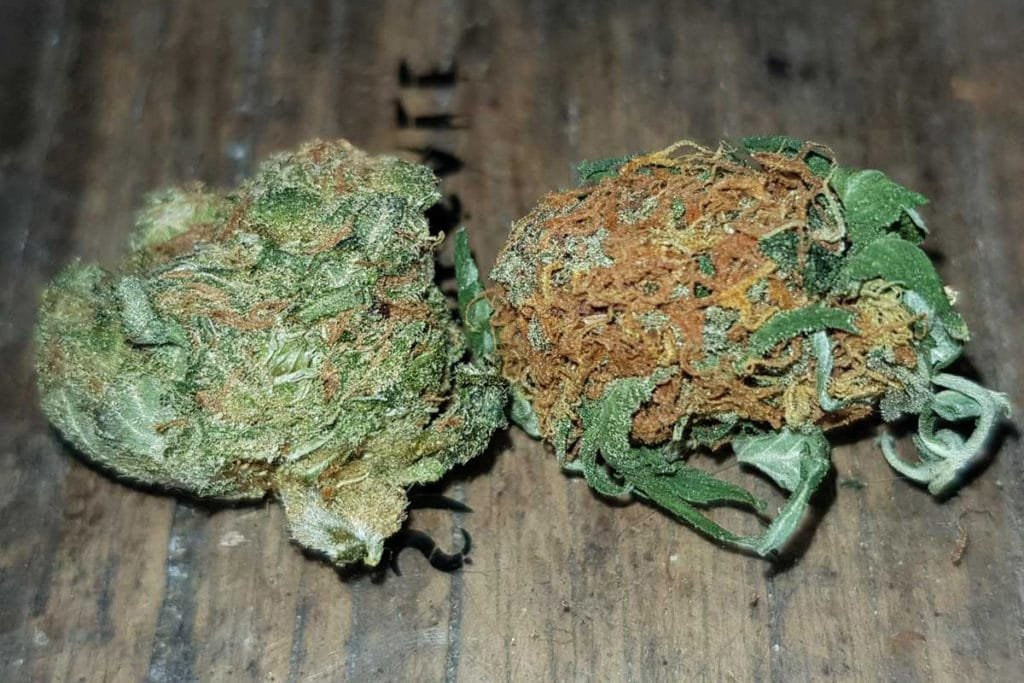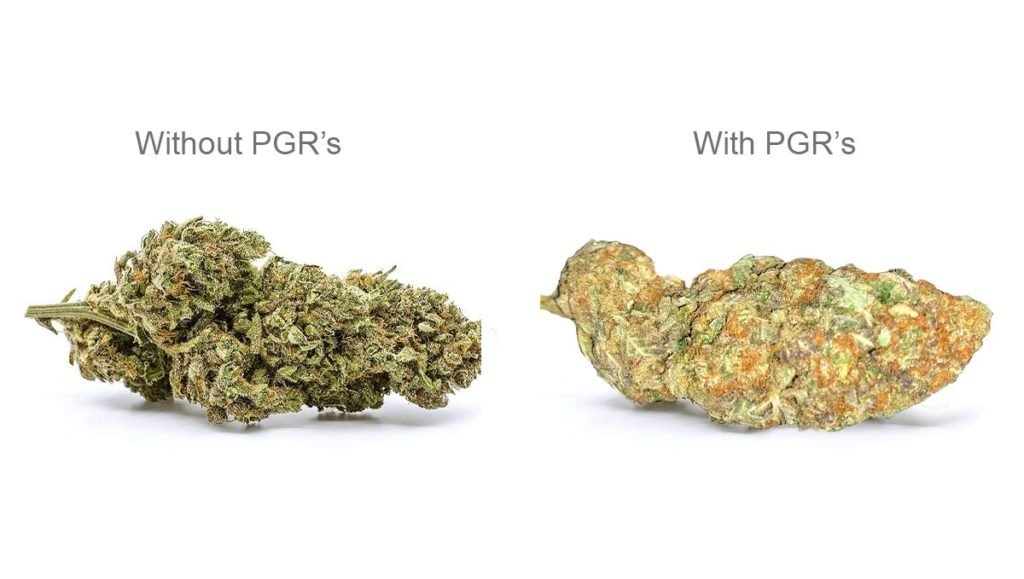Bodybuilders and farmers both hate to pass up an easy performance booster. Whether it’s pumping up those sweat-glistening biceps, or stackin’ more junk on the trunk of a nice fall crop, there’s no shortage of ways to increase gains- but at what cost? Lately, that discussion has taken to cannabis and we’ve been hearing a lot about so-called ‘PGR weed’. The general feeling seems to be that we’re talking about weed on steroids, and while we aren’t exactly enthused about smoking juiced up joints, nobody seems to agree on what’s what, and how big of a problem it really is. So what are PGRs exactly? Is PGR weed safe to smoke? How hard is it to spot PGR bud? My, don’t you have a lot of questions! Park it right there, Spud, and we’ll tell you everything we know about PGR cannabis.
Why are PGRs in Weed?
Whether or not they know it, all farmers rely on using PGRs! PGR stands for plant growth regulator but it’s really just a fancy way of saying plant hormones. Just like people and animals, plants also have natural hormones that control physiological functions and alter growth behaviors. Without PGRs, weed and all other plants wouldn’t grow. For example, when a seed sprouts, it’s due to hormones that say, “Hey, now is the time! Crack that shell and go see the world, baby!”
But it doesn’t end there. When the seedling’s cotyledon (those wee baby “leaves”) find sunlight or a source of light energy, it sends hormones called auxins to the roots, saying, “we found the light and we need more roots!”. If the roots are able to grow more, they’ll send gibberellin hormones to the leaves that say, “Everything looks good down here, keep on growing up top!” That conversation between auxin and gibberellin hormones happens naturally in grass, flowers, trees, and, of course, cannabis.

We call those (and many other) natural PGRs ‘endogenous’ because they’re produced ‘inside’ the plant itself. As you might have guessed, the discussion about dangerous PGR weed is about ‘exogenous’ PGRs or ‘outside’ PGRs that are added to soil or sprayed directly onto a plant. But even natural PGRs applied to the outside of a plant are considered exogenous! What we’re really concerned about is artificial PGRs that drastically alter a plant’s growth behavior and potentially have a toxic effect on humans. Let’s talk a little bit more about the difference between using the natural plant growth regulators weed growers can use safely and the artificial PGRs that have been proven toxic.
PGR Weed vs Natural Weed
Just like any type of farmer or gardener, weed growers often use PGRs to help them get better results. Growers can use products containing natural PGRs like auxins, gibberellins, abscisic acid, triacontanol, and ethylene to help guide the way their plants grow. For more drastic results, they can also use artificial PGRs that change how a plant produces it’s natural hormones.
Weed Grown with Natural PGRs
Natural PGRs can make a plant shorter or wider, make flowers form faster, or cause fruit to ripen. Whatever the situation, these natural PGRs are already made by the plant itself and it’s generally considered safe to use them on consumable plants, like herbs and vegetables.

One of the most common natural PGRs weed growers choose is triacontanol. It’s known to increase chlorophyll production in leaves and has been shown to increase yields for tomatoes, rice, and many other crops. Alfalfa hay (often used as horse feed) has naturally high levels of triacontanol, so it has naturally become a popular amendment for organic cannabis growers. Applying alfalfa hay or an alfalfa tea to your cannabis plants is an example of a natural, organic way of using PGRs.
But triacontanol isn’t just for organic growers. Anybody that’s visited a hydroponic store has probably seen Terpinator, Big Bud, and Bud Candy, which all contain triacontanol. Even though the triacontanol in these products is produced synthetically, it’s still considered a ‘natural’ PGR because it’s found in nature. This is where people start to disagree about the use of PGRs in marijuana plants- even though synthesized triacontanol products can be just as safe as organic ones, some people think that using too much will reduce the quality of the buds, even if it creates more yield.
Artificial PGR Weed
When it comes to artificial PGRs, however, many of them are actually illegal to use on consumable products in the United States. That’s because they have unnaturally strong effects on more than just plants: artificial PGRs like paclobutrazol have been linked to malformed organs, birth defects, and other ‘acute toxicities’ when applied topically or inhaled by rats. When combusted, paclobutrazol can produce cancer-causing nitrosamines. Other artificial PGRs with demonstrated risks to human health are daminozide (brand name Alar) and chlormequat chloride.

Although there’s not much data on human exposure to paclobutrazol, we share 99% of all our DNA with rats, so it’s reasonable to conclude that paclobutrazol shouldn’t be used on consumable plants like cannabis. Easy enough, right? But how can we know if paclobutrazol or other dangerous PGRs (or just the natural ones) have been used on the products we consume?
What Does PGR Weed Look Like?
This is where the debate really starts to pick up, and why it’s important to be specific about exactly what we’re talking about. There’s an assortment of plant growth regulators for weed that have different, sometimes opposite effects, and side-by-side pictures from Google that show PGR Weed VS Natural Weed aren’t that helpful and often become misleading. Paclobutrazol weed and other dangerous PGRs like daminozide may still be a major problem in Australia, for example, but not so much in the United States, where weird, hairy buds without much resin, smell, or taste just don’t have enough bag appeal. When’s the last time you thought about buying bud that looks like this:

That’s not to say you shouldn’t be careful in the U.S., but legalization has blessed us with better options. Above all else, stay away from overly hairy buds or weed that feels strangely squishy and spongy even when dry.
As for the average American tokers, we DO regularly consume PGR weed but it’s probably more common to see natural PGRs like triacontanol being used as bud hardeners than illegal usage of artificial PGRs like paclobutrazol. While natural PGRs may not be harmful to health, it’s important to note that increased density doesn’t mean better quality and that most PGR use is about making more money for the grower. It’s a lot like the use of growth hormones on dairy cows. There may not be damning evidence that rBST and rBGH are harmful to cows and humans, but it still makes a lot of people uncomfortable. Here’s examples of what the overuse of natural PGRs can do and some examples of buds that are “too dense”:


Even though the bud might be aromatic and fairly potent, it’s not what most connoisseurs would consider high quality. Again, it gets a bit tricky, as selective breeding for tight node-spacing and density has created weed that produces naturally dense flowers. But something like the above, where the buds resemble sphere-like rocks, is almost certainly not due solely to genetics. If you look up bud pictures from reputable breeders on social media, you’re not likely to find anything that closely resembles those pictures, even from their highest yielding strains.
Plant Growth Regulators in Weed
The debate around PGRs and weed is far from over but we hope it’s starting to make a little more sense. What’s clear is that nobody wants to inhale artificial PGRs like paclobutrazol, though the reduction in quality and freakishly hairy buds are often a dead giveaway of paclobutrazol cannabis. While it’s true that poorly grown weed which was harvested too early may also be weak, unappealing, and overly hairy without the use of PGRs, it begs the question- why risk your health for schwag? If you see the above signs of artificial PGR use, look elsewhere. When it comes to the use of strictly natural PGRs, there’s a much lower risk of chemical residues getting into our bodies, and if they do, there’s much less potential that they’ll harm us. Natural PGRs are commonly used to help growers form really dense weed to increase profits, but sometimes that can end up reducing the quality or potency of the end product. In the end that might not bother you, and density is often one thing people want, but if it’s been awhile since you tried “old school” fluffier weed, you might be surprised by what you’re been missing!
Finally, since there’s no magic way to detect PGR use, especially with products like Re-cover that counteract the effects of PGRs, our best advice is to know your sources, ask questions, and where possible, grow it yourself!
References
https://www.humboldtseeds.net/en/blog/plant-growth-regulators-weed
https://future4200.com/t/plant-growth-regulator-hormones/101380
https://budherd.com.au/articles/pgr-cannabis-what-is-a-plant-growth-regulator
